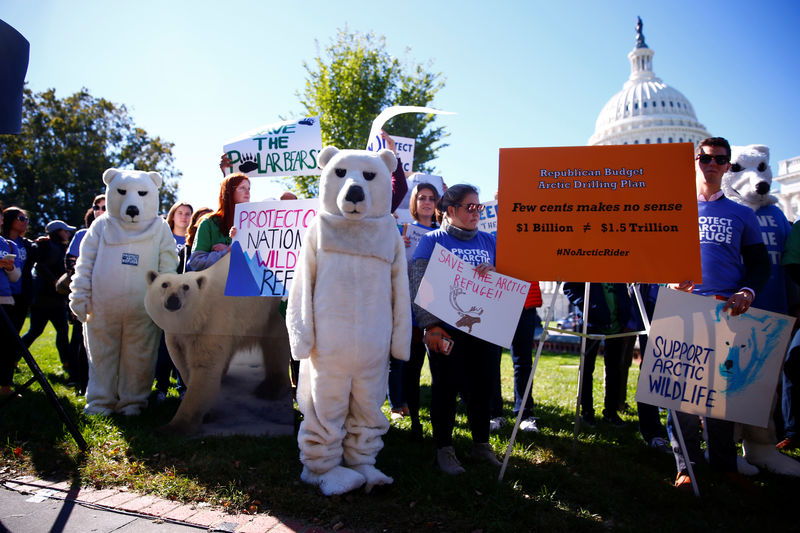By Yereth Rosen
ANCHORAGE, Alaska (Reuters) - Opponents of drilling for oil in the Arctic National Wildlife Refuge are lining up in Alaska and in Washington, calling the White House's efforts to open up the land "ecologically unsound."
Those against oil development in the ANWR coastal plain say the territory deserves protection from oil rigs, pipelines and roads that crisscross the rest of Alaska’s North Slope. ANWR had been off-limits to drilling for more than four decades before a Republican-passed tax bill in 2017.
The Trump administration has said it wants to hold a lease sale by year-end, which would meet the administration's aim of speeding up environmental review before drilling.
Drilling opponents spoke at a March 25 hearing before the Democratic-led U.S. House Natural Resources Committee.
The opponents include Alaska Natives, environmentalists and scientists who say the varied terrain is a poor fit for industrial travel on ice roads needed for development, and that the refuge has taken on increased importance due to sea ice loss that has caused polar bears to migrate inland.
"We believe such development is ecologically unsound and cannot be accomplished while also harboring the original purposes for which the Arctic Refuge was established and is still managed today," a group of more than 300 scientists and resource managers wrote in a March 7 letter to the U.S. Bureau of Land Management, the agency in charge of ANWR leasing.
The Trump administration has made energy dominance a key plank of economic development and foreign policy influence. U.S. oil production has surpassed 12 million barrels of oil a day, making it the world's biggest crude producer.
Alaska's production has dwindled to about 500,000 bpd from a peak of 2 million bpd in 1988. Industry interest in ANWR is unclear; it has been tested only once for the potential to extract fossil fuels.
The area is important for wildlife, most notably as the calving grounds for the Porcupine Caribou Herd, which roams northeastern Alaska and northwestern Canada. Canadian governments and tribes oppose ANWR development in large part because of threats to the herd, the subject of a 1987 U.S.-Canada treaty.
“If you drill in this sacred place it will destroy the caribou and therefore destroy the Gwich’in,” Dana Tizya-Tramm, chief of the Vuntut Gwitch'in First Nation in Canada’s Yukon Territory, told the House committee. Gwich’in Athabascans live along the Alaska-Canada border, and their culture is tied to the caribou.
However, the Inupiat of the North Slope, another indigenous group, supports ANWR development. The tax base from development is needed for "running water, reliable power, local education and improved health care," said Richard Glenn, vice president of the Inupiat-owned Arctic Slope Regional Corp, at the House hearing.
The U.S. Department of the Interior came under fire for continuing to plan for ANWR meetings during the government shutdown in January - an example, opponents say, of the White House rushing the process.
Republican U.S. Senator Lisa Murkowski of Alaska, a longtime proponent of ANWR drilling, told Reuters she does not think the process is being rushed.

"We have a lot of process to go through," she said. "We've got a ways to go and some time to do it, and I think we’ll do it right."